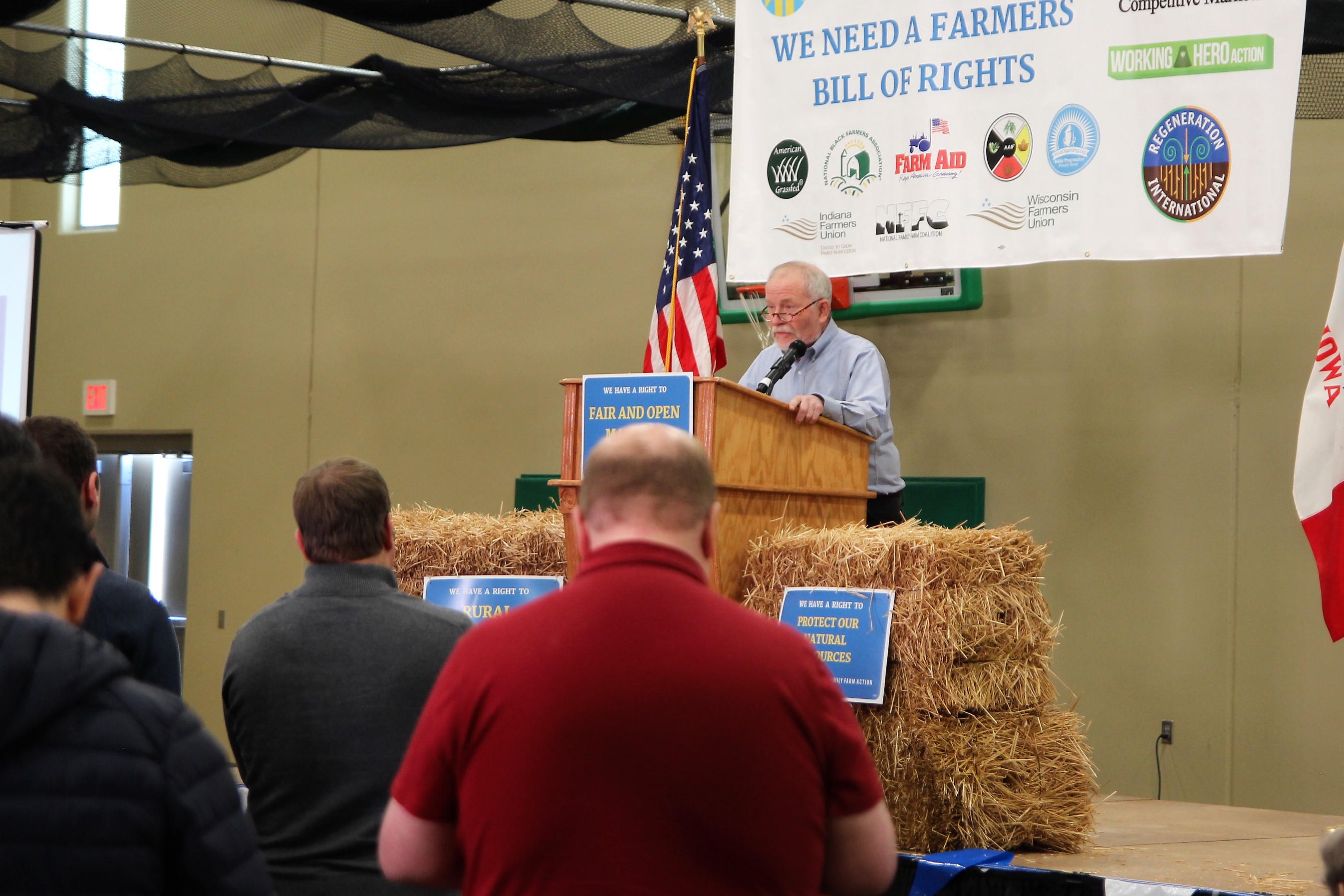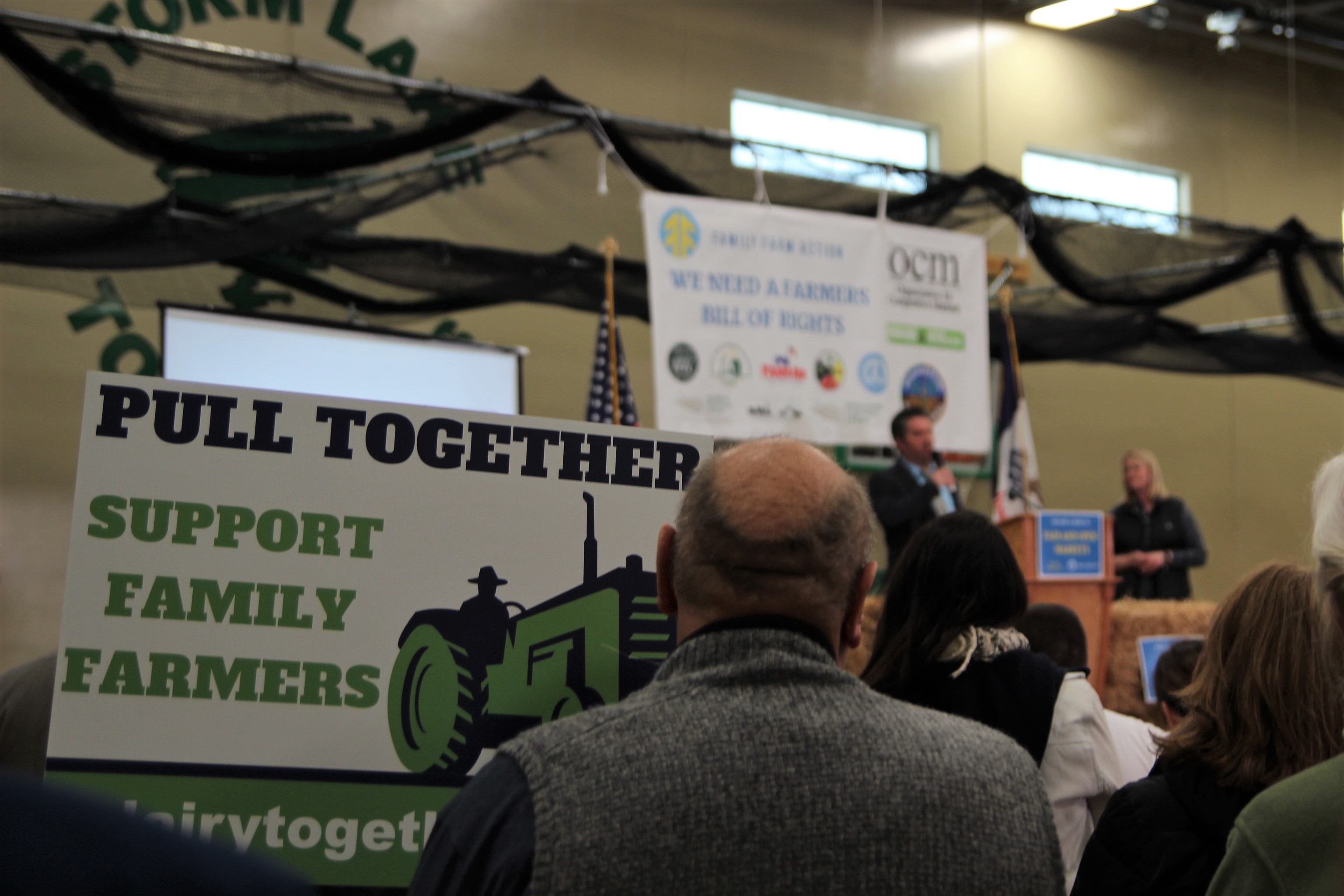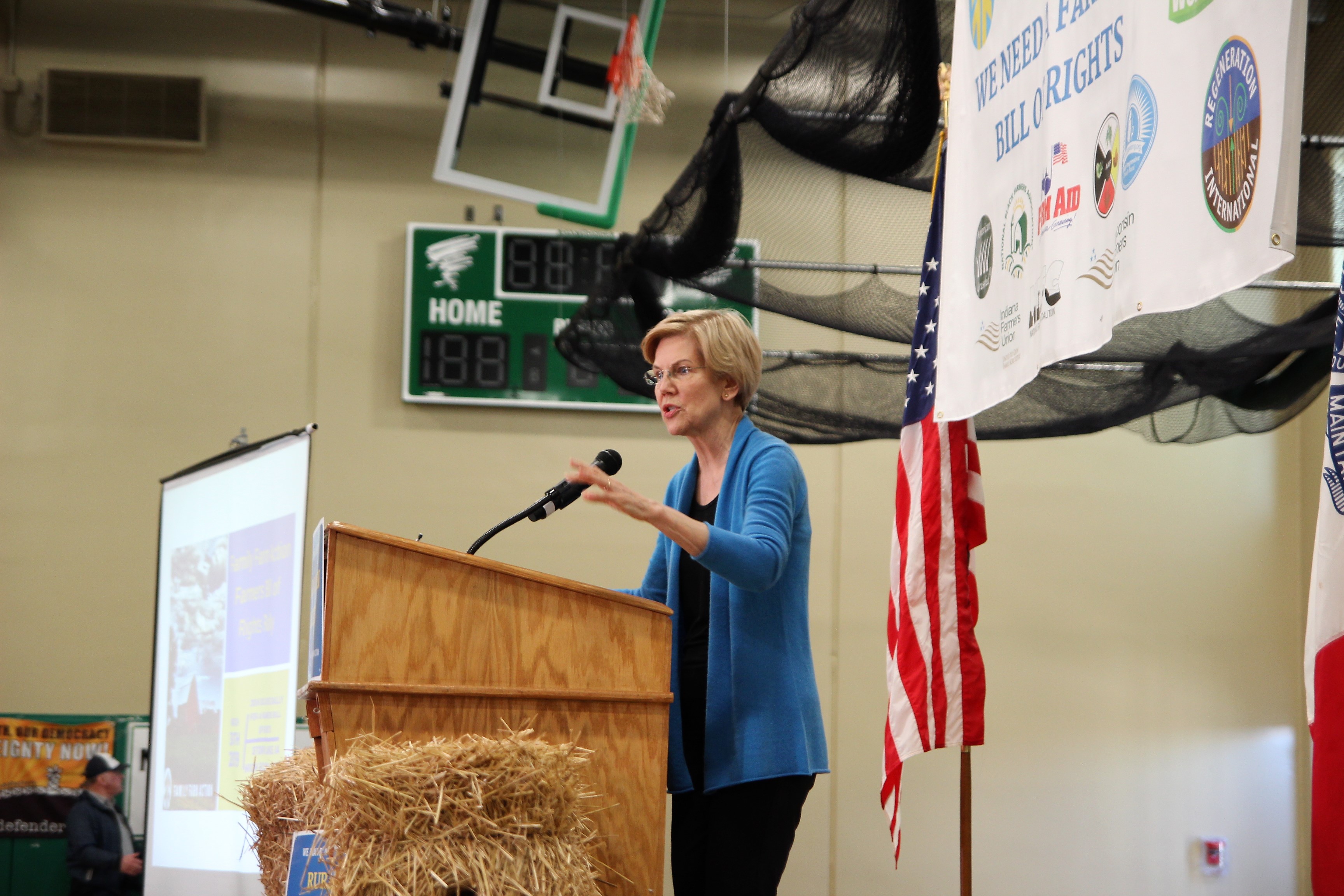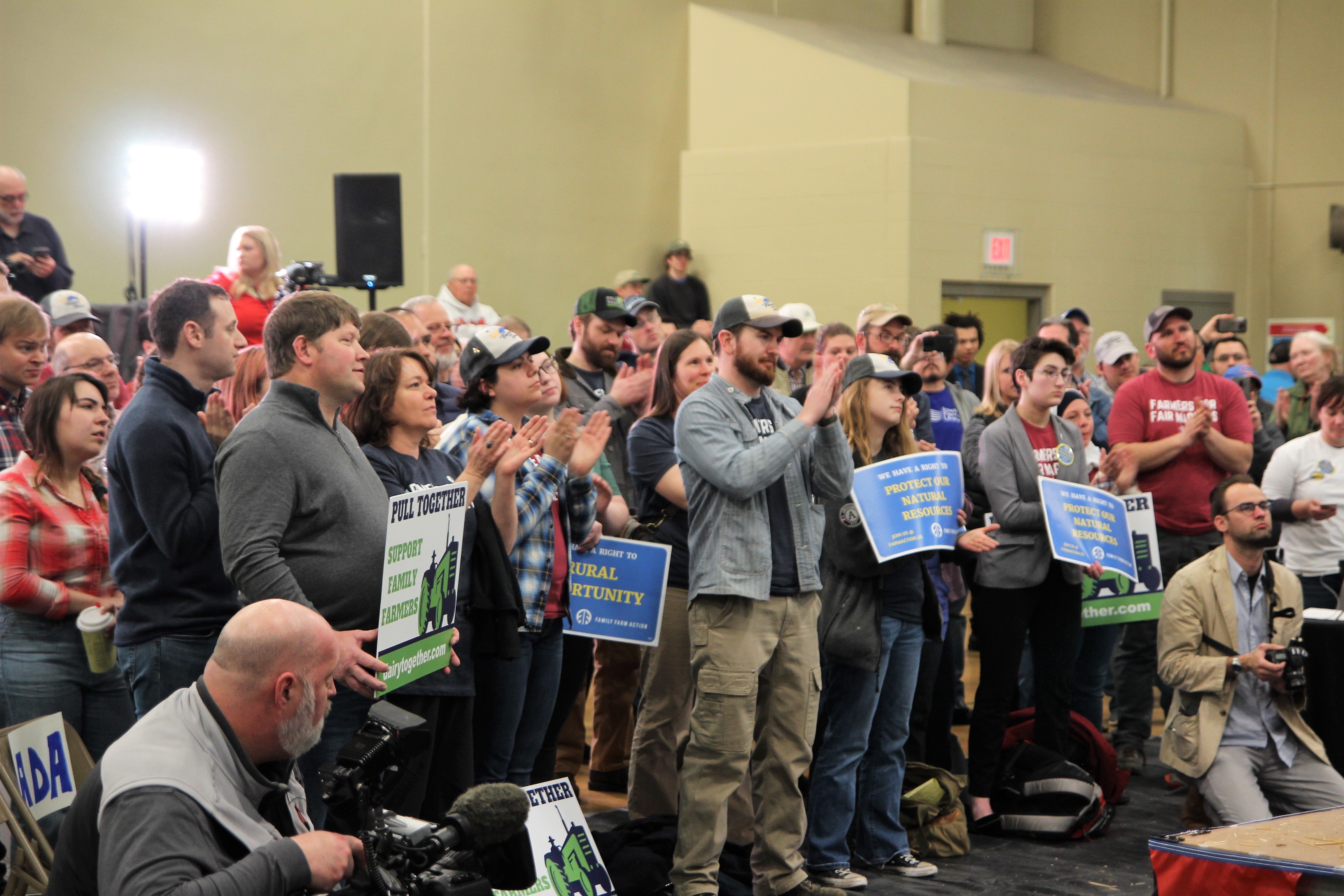On March 30, Midwest farmers rallied in Storm Lake, Iowa, calling for legislators and the U.S. Department of Agriculture to implement a nine article Farmers Bill of Rights which would aspire to, among others actions, enforce fair market practices and natural resource conservation rules. The rally, organized by Family Farm Action, was held as many farmers tried to estimate the damage to their livestock and stored grain and judge the ability to plant crops this year, following climate change-exacerbated flooding of their land and buildings.
Rally speakers pointed directly to the devastation of farm country caused by U.S. agricultural policy designed to support fewer and bigger agribusiness corporations rather than farmers themselves. Speakers called on presidential candidates on the campaign trail in Iowa to respond later that afternoon at the Heartland Forum, sponsored by the Huffington Post, Storm Lake Times, Open Markets Action and the Iowa Farmers Union.
Jim Goodman, a dairy farmer who had sold his cows (and just closed on the sale of his farm the day before) gave a critique of U.S. agriculture and trade policy. Goodman, president of the National Family Farm Coalition (NFFC), said that U.S. agribusiness had no right to “claim to feed the world” and that “something is wrong when we import 50 percent” of our horticulture products and only export cheap grains. He and other speakers called on Congress to restore Country of Origin Labeling legislation to help the marketing of U.S. meat and other agricultural products originating from farms that don’t contract their production with transnational agribusiness.

Jim Goodman, President of the NFFC
Patty Edelburg, a Wisconsin dairy farmer and vice president of the National Farmers Union, summarized the failure of the Farm Bill and U.S. trade policy to support family farmers: “The new [dairy compensation] program is still not going to do anything for supply. For 25 years we have been pushing for exports to raise prices and it hasn't done anything in 25 years. It's time for something to change."
Edelburg’s comments were well backed up with evidence and can apply to the destruction of supply management policies for more than just dairy. A March 22 Federal Reserve Bank of Minneapolis chart shows the brutal statistical truth of farmgate prices below the cost of production in most years since the 1996 “Freedom to Farm” Bill promised export-led farmer prosperity.
According to the Agricultural Policy Analysis Center, the removal of the last supply management mechanisms by “Freedom to Farm” doomed it to becoming “Freedom to Fail” for most farmers and rural communities. The NFFC, a Family Farm Action member, lobbied for restoration of dairy supply management in the 2014 Farm Bill.

Despite the evidence, U.S. trade policy has learned nothing from 25 years of failure for U.S. farmers. At the Heartland Forum, U.S. Dairy Export Council CEO (and former USDA Secretary and Governor of Iowa) Tom Vilsack spoke briefly. CEO Vilsack had testified to Congress in favor of measures that would eliminate Canada’s successful supply management program in the New NAFTA. IATP has written that the New NAFTA is among the trade policy strait-jackets that would hinder an updated U.S. supply management program to bring farmgate prices above the cost of production.
Speaking on behalf of the Organization for Competitive Markets, Chris Petersen, an independent hog farmer, called on Congress to pass the “Food and Agribusiness Merger Moratorium and Anti-Trust Review Act of 2018.” That bill was introduced in 2018 by presidential candidate, Senator Cory Booker (D-NJ) and Representative Mark Pocan (D-WI). (Sen. Booker, though not at the rally, sent a brief video message of support, as did former Rep. Beto O’Rourke (D-TX).) The bill, supported in a letter to Congress from 213 farmer, rural, consumer and faith-based organizations, reflects both the Family Farmer Action’s demand for the “Right to Fair and Open Markets” and the “Right to Food Security.”
The only presidential candidate to attend the rally, Senator Elizabeth Warren (D-MA), put her stamp of approval on the Farmers Bill of Rights, stressing its characterization of the foreign takeover of U.S. agribusinesses and purchase of U.S. farmland as threats to U.S. food security. Sen. Warren also announced the launch of her agricultural policy platform and reiterated her call for the break-up of Big Tech and, now, Big Ag mega-companies, as signature features of her campaign.

Senator Elizabeth Warren
Following the Family Farm Action rally, the Heartland Forum provided an early soap box for four announced (and one “maybe”) Democratic Party presidential candidates, including Senators Warren and Amy Klobuchar (D-MN), former Secretary of Housing and Urban Development Julian Castro, former Representative John Delaney (D-MD) and Representative Tim Ryan (D-OH)—who has since declared. The presidential hopefuls fielded questions from three moderators and preselected audience members.
Not surprisingly, farmers who spoke from personal experiences at the morning rally more directly addressed the effects and causes of the farm crisis than did the candidates who reverted to their stump speeches when they were uncertain about how to respond to questions. Still, some themes did emerge that suggest that Democratic candidates will not again make the 2016 campaign mistake of ignoring the contributions of rural Americans to our country and why their needs and ideas for solutions are crucial now—not just for the 2020 election.
Among those themes, breaking up vertical integration of agribusiness took first place. That integration was characterized in a recent Alan Guebert column cited in the Forum: “Walmart has Walmart contracted-truckers hauling Walmart contracted-milk to a Walmart bottling plant that Walmart will then process and haul to Walmart stores on Walmart trucks to sell directly to Walmart customers.” Sen. Warren pounded on the break-up message at both the rally and Forum; Sen. Klobuchar did so at the Forum. (Klobuchar is writing a book on anti-trust issues set to come out in six months, according to the Washington Post.)
Among the three moderators, Art Cullen, the Pulitzer Prize winning editor of the Storm Lake Times, posed perhaps the most trenchant question of long-term relevance to farmers while questioning Sen. Klobuchar. In summary: Iowa is losing its top soil—its “black gold”—at ten times the rate it can be replenished. Soil loss is a major factor in a projected 25 percent decrease in Iowa corn yields by 2050 under current agricultural practices. What would you do as President to prevent the realization of this scenario?
To an admittedly technical, yet crucial question, Sen. Klobuchar was unable to respond directly and deliver a firm, policy-backed answer (as was common for candidates during the forum). Sen. Klobuchar did call for a reentry to the Paris Climate Accord and the strengthening of conservation programs in the Farm Bill. But the precision and urgency of Cullen’s question echoed his concerns in a query posed to Rep. Ryan: Do we need to plant every acre of Iowa as corn and soybeans? Can we reorient our markets by re-carbonizing the soil?
While unresolved, the tension between short-term damage control and long-term structural and policy changes was palpable, and seized on by Cullen in his own reflections on the Forum appearing on April 1 in the Washington Post.
To IATP, it seemed that the rally’s speakers comprised a fierce and comprehensive rebuttal to New York Times columnist Paul Krugman’s contention that “Nobody knows how to reverse the heartland’s decline.” IATP’s letter to the editor added to that rebuttal: “Rural American history screams with the causal relationship between the introduction of policies for large-scale commodity agriculture and the never-ending farm crisis that began in the 1980s, cultural disintegration and economic unraveling of the heartland.”

And it seemed to us, too, that though Democratic presidential hopefuls were unable to detail policy to begin to reverse the Heartland’s decline, some of them, at least, are talking to the right people to help figure it out—the people who live in rural America.
As a Congressional bill to aid victims of climate change related disasters, include flood ravaged farms, stalls, (because President Trump believes that aid to Puerto Rican U.S. citizens would only “take from the USA”) it is difficult to think about declining corn yields in a Business As Usual Iowa or any other state. But as IATP staff drove back to Minneapolis past wind-swept fields without cover crops to hold on to Iowa’s “black gold” and without a USDA policy to mandate planting such crops, it was not hard to imagine Iowa’s agricultural future or our own.
